Yanis Varoufakis is full of teasing paradoxes. As a radical economics guru, he expounds on the state of the world with a mixture of burning grievance and brimming, almost imperious, self-confidence. Aged 57, his personal baggage includes a keen sense of the wrongs of recent Greek history, which overshadowed his parents’ lives, and the glories of the ancient Greek heritage. But his real obsession is with the future. “I am besotted with technology,” he declares, sitting in a relatively modest Athens apartment where there are no sepia photographs, antique tables or anything else that speaks obviously of the past. He loves being able to Skype his 13-year-old daughter, who lives with her mother in Sydney, every
Topics:
Yanis Varoufakis considers the following as important: DiEM25, English, Financial Times, Interviews, Lighthearted, MeRA25, Newspapers, Vital Space
This could be interesting, too:
Michael Hudson writes Something Nutty Emerging Here
Michael Hudson writes Why Banking Isn’t What You Think It Is
Michael Hudson writes The Horizon Nears on America’s Free Financial Ride
Michael Hudson writes Capital as Power in the Polycrisis
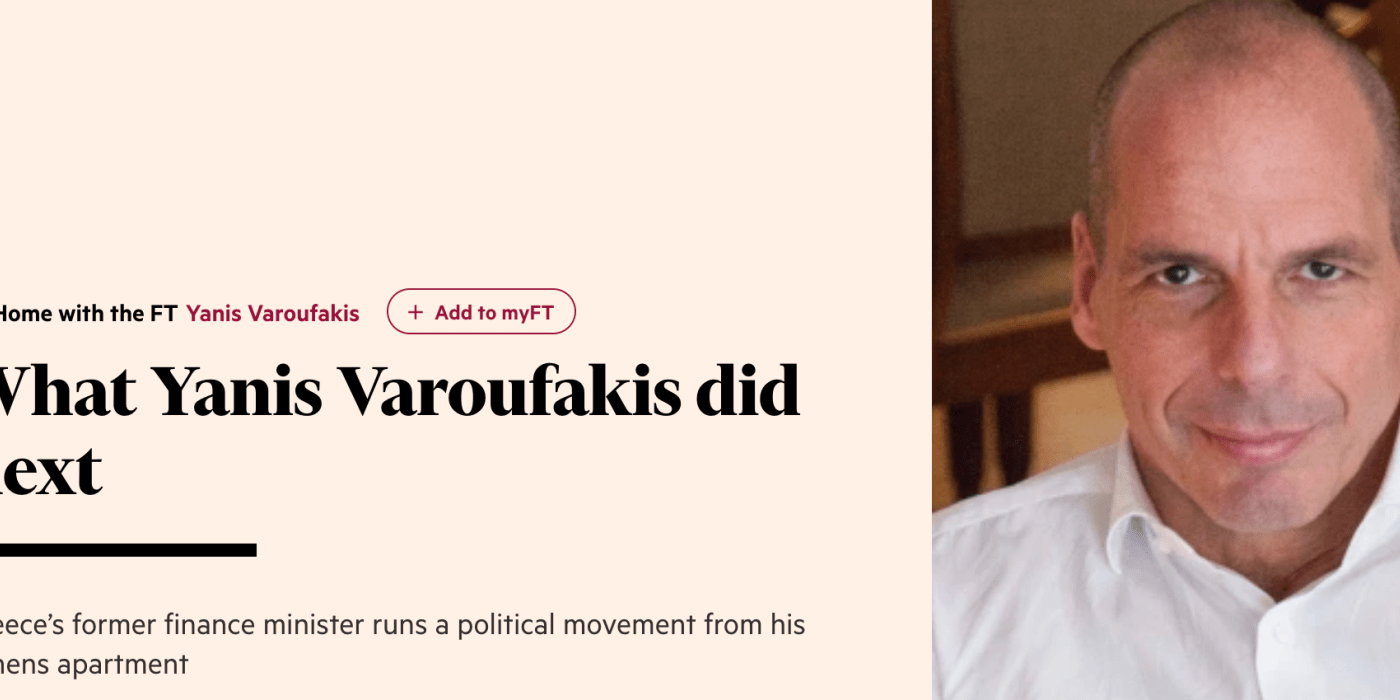
Yanis Varoufakis is full of teasing paradoxes. As a radical economics guru, he expounds on the state of the world with a mixture of burning grievance and brimming, almost imperious, self-confidence. Aged 57, his personal baggage includes a keen sense of the wrongs of recent Greek history, which overshadowed his parents’ lives, and the glories of the ancient Greek heritage. But his real obsession is with the future.
“I am besotted with technology,” he declares, sitting in a relatively modest Athens apartment where there are no sepia photographs, antique tables or anything else that speaks obviously of the past. He loves being able to Skype his 13-year-old daughter, who lives with her mother in Sydney, every morning, and he co-ordinates a pan-European political movement, DiEM25, with tele-conferences every few days.
As the moment demands, the things he says in eloquent, faintly accented English can be conciliatory or harsh. During his six stormy months as Greek finance minister, which ended with a bang in summer 2015, he was notorious for caustic soundbites. Whether or not they liked his policies, people enjoyed his description of Greece’s “fiscal waterboarding” by its creditors, and his comparison of the eurozone to Hotel California, where it’s easier to check in than to leave.
There are those, in both Athens and Brussels, who say that he bears a share of responsibility for the costly crisis in which Greeks faced sudden curbs on their cash movements, a disrupted tourist season and a near-crash out of the euro. Today, he is adamant that a fight between Greece and its creditors was inevitable. Without claiming infallibility, he insists: “I stand by the basic strategy I tried to follow, and in fact I was too lenient with the troika [of creditors].”
Varoufakis has at times been branded a high-living radical. During his time as finance minister, he lived in a desirable part of Athens near the Acropolis, courtesy of his parents-in-law. These days the base for his work is a fourth-floor apartment in a part of downtown Athens that is neither smart nor poor. The thunderous traffic and shabby stadium of Alexandras Avenue, marking the northern edge of the city centre, are only a few minutes away, but somehow his street is a quiet haven.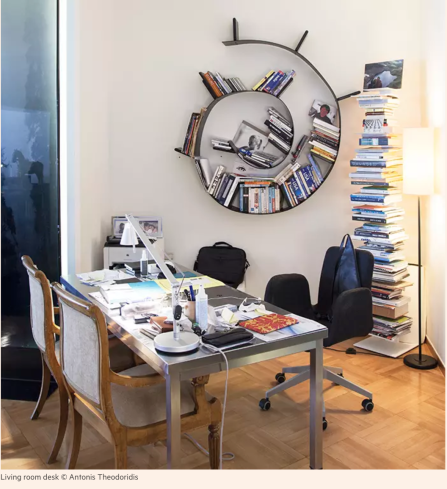
That is fortunate, because this rented expanse of parquet floor is only just big enough for the characters, human and otherwise, whose lives intertwine in it. Although she appears only briefly, the first impression on visiting the flat is of the fire that still crackles between Varoufakis and his wife Danae Stratou, an installation artist, photographer and art professor. Most of the objects in view are startling, experimental creations by Stratou or her pupils or friends. Having worked as an academic in England, as well as Sydney and Austin, Texas, Varoufakis doesn’t have many permanent possessions except books.
There is another house, too, on the nearby island of Aegina, on a hillside where Stratou’s father, an industrialist, parcelled out a piece of land between his daughters. In Varoufakis’s latest book, presented as an attempt to explain economic history to his daughter, there are idyllic descriptions of their summer meetings on the island. “I make sure I don’t have any work with me,” he says, “we go for walks, we go out on a boat, that’s where we have the opportunity for conversations.”
Sentimentally speaking, he says, “our real home is in Aegina”, but the majority of the couple’s time is spent amid the Athenian fumes, and that also has compensations. He enjoys living so close to Loras Bar, “a fantastic hang-out where I used to go as a young man,” which still sells good cocktails. They both have offices elsewhere in the city, but a lot of their work is done in the flat, at desks in adjoining rooms. Varoufakis launched the Greek branch of DiEM25 in March, vowing “constructive disobedience” if Euro-crats tried to stop a future Athens government from reflating the economy by cutting taxes.
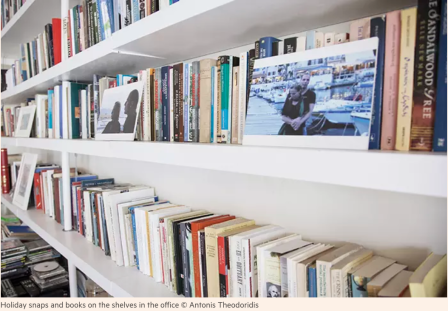 Across Europe, the movement’s aim is what Varoufakis calls a genuinely federal, and more democratic, EU. With supporters including Brian Eno, Julian Assange and Slavoj Zizek, it favours a green investment programme and generosity to refugees. It will field a list of candidates at next year’s European Parliament elections. “In some countries we will work with existing parties; in others we will start new ones,” explains Varoufakis, with the self-assurance of a man who can make a Herculean task sound manageable. Hectic as their lives are, Varoufakis and Stratou make time for a relaxed breakfast, and compete to spoil Mowgli, a lolloping white-and-fawn Labrador who is less than a year old. Next to Varoufakis’s piled-high desk is a cosy space where “we have our morning coffee, with the dog going from one of us to the other, having apple from me and yoghurt from Danae . . . those Labradors never stop eating.”
Across Europe, the movement’s aim is what Varoufakis calls a genuinely federal, and more democratic, EU. With supporters including Brian Eno, Julian Assange and Slavoj Zizek, it favours a green investment programme and generosity to refugees. It will field a list of candidates at next year’s European Parliament elections. “In some countries we will work with existing parties; in others we will start new ones,” explains Varoufakis, with the self-assurance of a man who can make a Herculean task sound manageable. Hectic as their lives are, Varoufakis and Stratou make time for a relaxed breakfast, and compete to spoil Mowgli, a lolloping white-and-fawn Labrador who is less than a year old. Next to Varoufakis’s piled-high desk is a cosy space where “we have our morning coffee, with the dog going from one of us to the other, having apple from me and yoghurt from Danae . . . those Labradors never stop eating.”
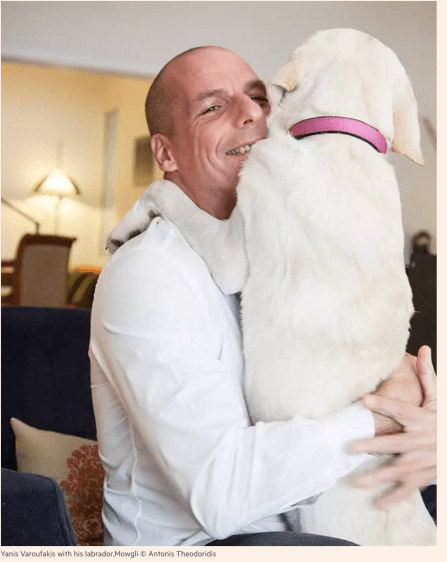 At the time of our visit, Mowgli is being fussed over because of a leg wound; as soon as this heals, his master and mistress will resume their daily dog walks over Mount Lycabettus, a stony outcrop that relieves the city’s concrete monotony. In the evening, Stratou’s 23-year-old son Nikos, who lives with them, often takes the hound for another lengthy stroll. “Those two boys, I don’t know what they get up to,” Varoufakis mutters with a grin.
At the time of our visit, Mowgli is being fussed over because of a leg wound; as soon as this heals, his master and mistress will resume their daily dog walks over Mount Lycabettus, a stony outcrop that relieves the city’s concrete monotony. In the evening, Stratou’s 23-year-old son Nikos, who lives with them, often takes the hound for another lengthy stroll. “Those two boys, I don’t know what they get up to,” Varoufakis mutters with a grin.
Looming over the apartment’s main sitting area, there is a large memento of a more rigorous mountain hike which Varoufakis and Stratou undertook a dozen years ago to seal their relationship. It is a photograph of a rice field on the front line of Kashmir’s war zone. As he recalls, within days of their decision to end their previous marriages and share their lives, he joined Stratou on a round-the-world tour. Her aim was to capture the nodal points of regions divided by conflict, ranging from Belfast to the Horn of Africa. He enjoys reminiscing about their Kashmiri scrapes. To ascend a towering peak, they persuaded a local man to crank up an ancient ski lift, but they had to scramble down on foot and Varoufakis nearly tumbled to his death. “I looked down and my feet were dangling from a cliff, and it was a 100-metre drop . . . ”
In the midst of the sitting space is a large table created by Stratou: a glass surface covering a carefully constructed metal labyrinth. Since childhood, Varoufakis explains, his wife has been intrigued by spirals. He, too, has long been fascinated with the story of the Minotaur, who waits at the heart of an underground maze to devour his annual quota of youths and maidens: “a dirty secret in the guts of the palace”, whose preservation is necessary to keep the system going. It is a useful metaphor, he argues, for Wall Street, which demands “tribute” from the surpluses of other capitalist countries.
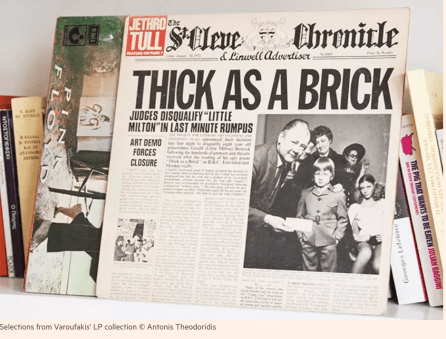 Varoufakis loves talking about ancient Greece, in whose history and literature he was drilled at one of the city’s elite private day schools. As he reminisces about his father, still thriving in his mid-90s, he reveals an unexpected fact. It is common knowledge that, having endured prison as a suspected communist in the late 1940s, George Varoufakis became the right-hand person of a steel magnate. Less well known is his contribution to archaeology. Varoufakis senior pinpointed how the builders of the Parthenon used an iron-zinc alloy to stabilise the marble columns; they knew far more than some of the hapless would-be conservators of modern times. Varoufakis relishes his father’s discovery. “What a fantastic thing to find! The ancient iron rods lasted 2,000 years whereas the new ones, made of Birmingham steel, had rusted within two years.”
Varoufakis loves talking about ancient Greece, in whose history and literature he was drilled at one of the city’s elite private day schools. As he reminisces about his father, still thriving in his mid-90s, he reveals an unexpected fact. It is common knowledge that, having endured prison as a suspected communist in the late 1940s, George Varoufakis became the right-hand person of a steel magnate. Less well known is his contribution to archaeology. Varoufakis senior pinpointed how the builders of the Parthenon used an iron-zinc alloy to stabilise the marble columns; they knew far more than some of the hapless would-be conservators of modern times. Varoufakis relishes his father’s discovery. “What a fantastic thing to find! The ancient iron rods lasted 2,000 years whereas the new ones, made of Birmingham steel, had rusted within two years.”
Varoufakis shares his father’s penchant for delving into the genius of the past and asking how a similar spirit might guide the future. He describes himself as a libertarian follower of Karl Marx, and he thinks the German philosopher would be fascinated by today’s technology and the way it could change society. He realised this, he says, when acting as a consultant on economics for Valve, a Seattle-based computer games firm, in 2012. He observed with fascination how a new capitalism was emerging, with democratic decision-making and spontaneous team-building.
“Because there was no hierarchy, everybody did their own thing. And you had to walk around and meet people and say ‘Will you tell me what you do, so I can see if I can work with you?’ ” Agree with him or not, Varoufakis is a stimulating interlocutor, switching fluently between topics, countries and aeons of history. Among the handful of objects that recall his peripatetic life are his teenage LPs (he liked Roxy Music) and a small table made of Australian tropical wood. Yet he has found ways of making up for this deficit. His home life reveals an intense, durable attachment to intangible things, especially relationships — whether human or canine, long-distance or near-at-hand.
———–
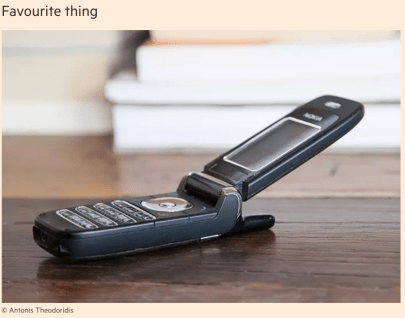 FAVOURITE THING: A once-snazzy mobile phone is the unlikely keepsake that Varoufakis uses to remember his mother Eleni, who died 10 years ago. They had a close but demanding relationship, based on tough love. He was an exasperating child, who would act lazy and then cram at the last minute, getting excellent results. So she bargained with him, setting him a programme of Greek and world literature that he had to read by the age of 13. It was understood that if he obeyed, he would be allowed more freedom. “I could get on my bike and disappear for hours, as long as I read my Dostoyevsky.” Despite her conservative family roots, Varoufakis’s mother converged politically with his father as a supporter of PASOK, the Greek Socialist movement that swept to power in 1981. Eleni became prominent in PASOK’s feminist wing, and in local government. She was a moderniser, not a sentimentalist, and her son was proud of that.
FAVOURITE THING: A once-snazzy mobile phone is the unlikely keepsake that Varoufakis uses to remember his mother Eleni, who died 10 years ago. They had a close but demanding relationship, based on tough love. He was an exasperating child, who would act lazy and then cram at the last minute, getting excellent results. So she bargained with him, setting him a programme of Greek and world literature that he had to read by the age of 13. It was understood that if he obeyed, he would be allowed more freedom. “I could get on my bike and disappear for hours, as long as I read my Dostoyevsky.” Despite her conservative family roots, Varoufakis’s mother converged politically with his father as a supporter of PASOK, the Greek Socialist movement that swept to power in 1981. Eleni became prominent in PASOK’s feminist wing, and in local government. She was a moderniser, not a sentimentalist, and her son was proud of that.
FOR THE SITE OF THE FINANCIAL TIMES CLICK HERE
